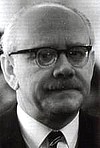Dr. Fritz Bock

Personalia
Born:
Died:
Profession:
Persecution:
Imprisonment 15.03.1938 - 02.04.1938,
Dachau concentration camp 02.04.1938 - 20.01.1939
KZ Number:
Memberships
Curriculum Vitae
Fritz Bock is the son of post office director Friedrich Bock and attends the Hietzinger Gymnasium in Vienna from the 1922/23 school year. In 1928, he was accepted into the recently founded secondary school fraternity Rugia. However, Rugia, which is still involved in the founding of the MKV in 1933, cannot survive and disbands. Fritz Bock and his fraternity brothers were accepted into the middle school fraternity Thuringia in 1937.
After graduating from high school in 1930, he began his studies at the Faculty of Law at the University of Vienna and joined the student fraternity Nordgau Wien in 1930. He actively participates in the "Youth in Work" and "Youth in Need" campaigns. He does not have fond memories of his student years at Vienna University, where fights between CVers and National Socialists were on the agenda and he was in the thick of things when it came to "protecting fellow Jewish students"
1934 Deputy Federal Publicity Director of the Vaterländische Front. After obtaining his doctorate in law in 1936, he became a full-time member of the Vaterländische Front.
Shortly after the occupation of Austria by Hitler's Germany, he was arrested on March 15, 1938. He spent ten days in secret detention at the police station in Hietzing, was then transferred to the police remand prison on Elisabethpromenade, the "Liesl", from where he was taken to Westbahnhof on April 2 and on the first transport, the so-called 'Prominententransport', to the Dachau concentration camp.
[...] At the end of this 'journey', many of us had faces so battered that they no longer resembled a human face. When, after a journey of almost twelve hours, we reached the marshalling yard in front of the Dachau camp, it was just a staggering mass of human creatures that had to line up in front of the Dachau camp command building.
Fritz Bock is released on January 20, 1939 due to incapacity and is then under Gestapo police surveillance until the end of the war. He was classified as unworthy of military service and banned from working, but was later able to work as a chartered accountant. Despite all the surveillance, he manages to make contact with the resistance group "05". Shortly before the end of the war, he escapes re-arrest by fleeing to the Innviertel region, which is liberated by the US army shortly afterwards.
After the war, he is actively involved in the reconstruction of Austria and is one of the founders of the Austrian People's Party (ÖVP). He joins the ÖVP-Kameradschaft der politisch Verfolgten und Bekenner für Österreich and held various political positions, including Head of the Office of the General Secretariat of the ÖVP in 1946 and General Secretary of the ÖAAB from 1947-1953, as well as Member of the National Council from 1949-1953 and 1956-1962, State Secretary and then Minister of Trade and Vice-Chancellor of the Republic of Austria for many years. He retired from active politics in 1968 and became Chairman of the Supervisory Board of Creditanstalt (1969-1989).
Finally, he was Vice President of the Dokumentationsarchiv des Österreichischen Widerstandes (DÖW). He died in Vienna at the age of 82 and was laid to rest at the cemetery in Vienna-Hernals.
Citations
Krause, Peter/Reinelt, Herbert/Schmitt, Helmut (2020): Farbe tragen, Farbe bekennen. Katholische Korporierte in Widerstand und Verfolgung. Teil 2. Kuhl, Manfred (ÖVfStG, Wien) S. 35.
Wikipedia unter de.wikipedia.org/wiki/Fritz_Bock
Wiener Stadt- und Landesarchiv (WStLA)
Friedhöfe Wien - Verstorbenensuche
